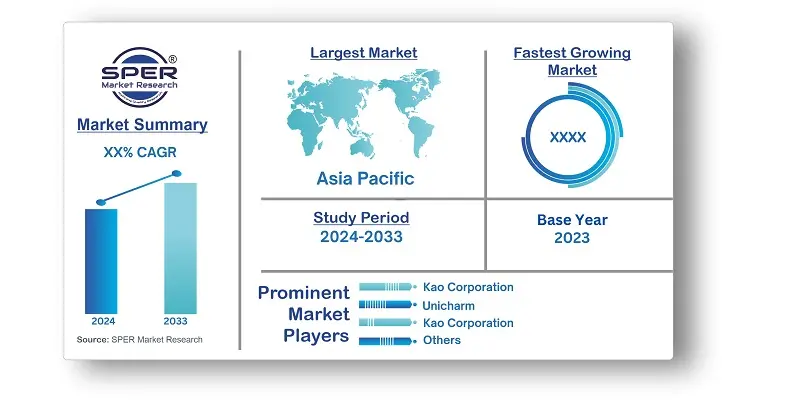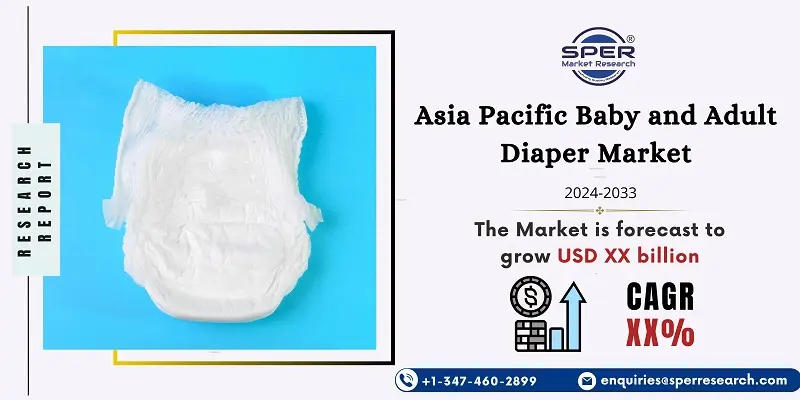
Asia Pacific Baby and Adult Diaper Market Trends, Share, Demand, Revenue and Future Outlook
Asia Pacific Baby and Adult Diaper Market Growth, Size, Trends Analysis- By Product Type, By Material- Regional Outlook, Competitive Strategies and Segment Forecast to 2033
| Published: Nov-2024 | Report ID: FMCG24200 | Pages: 1 - 163 | Formats*: |
| Category : Consumer & Retail | |||


| Report Metric | Details |
| Market size available for years | 2020-2033 |
| Base year considered | 2023 |
| Forecast period | 2024-2033 |
| Segments covered | By Product Type, By Material |
| Regions covered | Australia, China, India, Japan, South Korea, Rest of Asia-Pacific. |
| Companies Covered | Abena, Daio Paper, DaddyBaby, First Quality Enterprise, Kao Corporation, Medline, Nobel Hygiene, Procter & Gamble (P&G), Unicharm, Kao Corporation, Others. |
- Supply Chain interruption: The interruption of supply chains was one of the main issues encountered during the epidemic. Diapers were not readily available in many nations as a result of manufacturing and distribution delays brought on by lockdowns, plant closures, and limitations on international trade. This was especially noticeable in markets where demand exceeded supply, leading to brief shortages and compelling customers to look for other brands or items.
- Increasing Demand for Hygiene goods: Conversely, the epidemic raised awareness of sanitation and hygiene issues, which in turn raised demand for disposable hygiene goods like diapers.
- Parents of Infants and Toddlers
- Caregivers of Elderly or Incontinent Individuals
- Healthcare Providers and Institutions
- Middle-Income Families
- Low-Income Families
- Elderly Population (Direct Consumers)
- Online Shoppers
- Retailers and Distributors
- Hospitals and Nursing Homes
| By Product Type: | |
| By Material: |
- Asia Pacific Baby and Adult Diaper Market Size (FY’2024-FY’2033)
- Overview of Asia Pacific Baby and Adult Diaper Market
- Segmentation of Asia Pacific Baby and Adult Diaper Market By Product Type (Pant Type, Tape Type, Pad Type)
- Segmentation of Asia Pacific Baby and Adult Diaper Market By Material (Disposable Diapers, Training Nappies, Cloth Diapers)
- Expansion Analysis of Asia Pacific Baby and Adult Diaper Market
- Problems and Obstacles in Asia Pacific Baby and Adult Diaper Market
- Competitive Landscape in the Asia Pacific Baby and Adult Diaper Market
- Impact of COVID-19 and Demonetization on Asia Pacific Baby and Adult Diaper Market
- Details on Current Investment in Asia Pacific Baby and Adult Diaper Market
- Competitive Analysis of Asia Pacific Baby and Adult Diaper Market
- Prominent Players in the Asia Pacific Baby and Adult Diaper Market
- SWOT Analysis of Asia Pacific Baby and Adult Diaper Market
- Asia Pacific Baby and Adult Diaper Market Future Outlook and Projections (FY’2024-FY’2033)
- Recommendations from Analyst
1.1. Scope of the report1.2. Market segment analysis
2.1. Research data source
2.1.1. Secondary Data2.1.2. Primary Data2.1.3. SPERs internal database2.1.4. Premium insight from KOLs
2.2. Market size estimation
2.2.1. Top-down and Bottom-up approach
2.3. Data triangulation
4.1. Driver, Restraint, Opportunity and Challenges analysis
4.1.1. Drivers4.1.2. Restraints4.1.3. Opportunities4.1.4. Challenges
4.2. COVID-19 Impacts of the Asia Pacific Baby and Adult Diaper Market
5.1. SWOT Analysis
5.1.1. Strengths5.1.2. Weaknesses5.1.3. Opportunities5.1.4. Threats
5.2. PESTEL Analysis
5.2.1. Political Landscape5.2.2. Economic Landscape5.2.3. Social Landscape5.2.4. Technological Landscape5.2.5. Environmental Landscape5.2.6. Legal Landscape
5.3. PORTERs Five Forces
5.3.1. Bargaining power of suppliers5.3.2. Bargaining power of buyers5.3.3. Threat of Substitute5.3.4. Threat of new entrant5.3.5. Competitive rivalry
5.4. Heat Map Analysis
6.1. Asia Pacific Baby and Adult Diaper Market Manufacturing Base Distribution, Sales Area, Product Type6.2. Mergers & Acquisitions, Partnerships, Product Launch, and Collaboration in Asia Pacific Baby and Adult Diaper Market
7.1. Asia Pacific Baby and Adult Diaper Market Size, Share and Forecast, By Product Type, 2020-20267.2. Asia Pacific Baby and Adult Diaper Market Size, Share and Forecast, By Product Type, 2027-20337.3. Pant Type7.4. Tape Type7.5. Pad Type
8.1. Asia Pacific Baby and Adult Diaper Market Size, Share and Forecast, By Material, 2020-20268.2. Asia Pacific Baby and Adult Diaper Market Size, Share and Forecast, By Material, 2027-20338.3. Disposable Diapers8.4. Training Nappies8.5. Cloth Diapers
9.1. Asia Pacific Baby and Adult Diaper Market Size and Market Share
10.1. Asia Pacific Baby and Adult Diaper Market Size and Market Share By Region (2020-2026)10.2. Asia Pacific Baby and Adult Diaper Market Size and Market Share By Region (2027-2033)10.3. Australia10.4. China10.5. India10.6. Japan10.7. South Korea10.8. Rest of Asia-Pacific
11.1. Abena
11.1.1. Company details11.1.2. Financial outlook11.1.3. Product summary11.1.4. Recent developments
11.2. Daio Paper
11.2.1. Company details11.2.2. Financial outlook11.2.3. Product summary11.2.4. Recent developments
11.3. DaddyBaby
11.3.1. Company details11.3.2. Financial outlook11.3.3. Product summary11.3.4. Recent developments
11.4. First Quality Enterprise
11.4.1. Company details11.4.2. Financial outlook11.4.3. Product summary11.4.4. Recent developments
11.5. Kao Corporation
11.5.1. Company details11.5.2. Financial outlook11.5.3. Product summary11.5.4. Recent developments
11.6. Medline
11.6.1. Company details11.6.2. Financial outlook11.6.3. Product summary11.6.4. Recent developments
11.7. Nobel Hygiene
11.7.1. Company details11.7.2. Financial outlook11.7.3. Product summary11.7.4. Recent developments
11.8. Procter & Gamble (P&G)
11.8.1. Company details11.8.2. Financial outlook11.8.3. Product summary11.8.4. Recent developments
11.9. Unicharm
11.9.1. Company details11.9.2. Financial outlook11.9.3. Product summary11.9.4. Recent developments
11.10. Kao Corporation
11.10.1. Company details11.10.2. Financial outlook11.10.3. Product summary11.10.4. Recent developments
11.11. Others
SPER Market Research’s methodology uses great emphasis on primary research to ensure that the market intelligence insights are up to date, reliable and accurate. Primary interviews are done with players involved in each phase of a supply chain to analyze the market forecasting. The secondary research method is used to help you fully understand how the future markets and the spending patterns look likes.
The report is based on in-depth qualitative and quantitative analysis of the Product Market. The quantitative analysis involves the application of various projection and sampling techniques. The qualitative analysis involves primary interviews, surveys, and vendor briefings. The data gathered as a result of these processes are validated through experts opinion. Our research methodology entails an ideal mixture of primary and secondary initiatives.



Frequently Asked Questions About This Report
PLACE AN ORDER
Year End Discount
Sample Report
Pre-Purchase Inquiry
NEED CUSTOMIZATION?
Request CustomizationCALL OR EMAIL US
100% Secure Payment






Related Reports
Our Global Clients
Our data-driven insights have influenced the strategy of 200+ reputed companies across the globe.




















